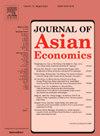基于进化博弈论的城市低效土地集约利用机制与模拟
IF 2.9
3区 经济学
Q1 ECONOMICS
引用次数: 0
摘要
城市低效土地的集约利用是实现城市可持续发展的关键。本研究构建了一个城市低效土地再开发的演化博弈模型,涉及三个主要行为体:政府、开发商和公众。该模型揭示了再开发过程的阶段性特征以及参与者决策行为的动态演化。研究发现,重建过程可分为三个阶段:初始阶段、发展阶段和成熟阶段,在每个阶段,开发商、政府和公众的决策行为都存在显著差异。开发商的决策受到重建收益和成本的影响,政府的决策受到监管收益的影响,而公众的决策则受到参与收益和成本的影响。初始战略配置对系统的演化趋势有重大影响。经济激励、成本约束和公众参与是推动重建的三大支柱。研究建议采取差异化的动态政策组合,完善再开发利益分配机制,加强公众参与能力建设,促进各行为主体之间的良性互动,实现土地资源的高效利用。本研究从动态博弈的视角系统分析了低效土地再开发的机理,为政策制定提供了科学依据,对促进城市可持续发展具有重要意义。本文章由计算机程序翻译,如有差异,请以英文原文为准。
Mechanism and simulation of intensive use of urban inefficient land based on evolutionary game theory
Intensive utilization of urban inefficient land is crucial for achieving sustainable urban development. This study constructs an evolutionary game model of urban inefficient land redevelopment involving three main actors: the government, developers, and the public. The model reveals the staged characteristics of the redevelopment process and the dynamic evolution of decision-making behaviors among the actors. The study finds that the redevelopment process can be divided into three stages: initial, development, and mature, with significant differences in the decision-making behaviors of developers, the government, and the public at each stage. Developers' decisions are influenced by redevelopment benefits and costs, the government's decisions are affected by regulatory benefits, and the public's decisions are impacted by participation benefits and costs. The initial strategy configuration has a significant influence on the system's evolutionary trend. Economic incentives, cost constraints, and public participation are the three pillars driving redevelopment. The study recommends adopting differentiated and dynamic policy combinations, improving the redevelopment benefit distribution mechanism, and strengthening public participation capacity building to promote positive interactions among the actors and achieve efficient land resource utilization. This research systematically analyzes the mechanism of inefficient land redevelopment from a dynamic game perspective, providing a scientific basis for policy formulation and holding great significance for promoting sustainable urban development.
求助全文
通过发布文献求助,成功后即可免费获取论文全文。
去求助
来源期刊

Journal of Asian Economics
ECONOMICS-
CiteScore
4.70
自引率
9.40%
发文量
90
期刊介绍:
The Journal of Asian Economics provides a forum for publication of increasingly growing research in Asian economic studies and a unique forum for continental Asian economic studies with focus on (i) special studies in adaptive innovation paradigms in Asian economic regimes, (ii) studies relative to unique dimensions of Asian economic development paradigm, as they are investigated by researchers, (iii) comparative studies of development paradigms in other developing continents, Latin America and Africa, (iv) the emerging new pattern of comparative advantages between Asian countries and the United States and North America.
 求助内容:
求助内容: 应助结果提醒方式:
应助结果提醒方式:


